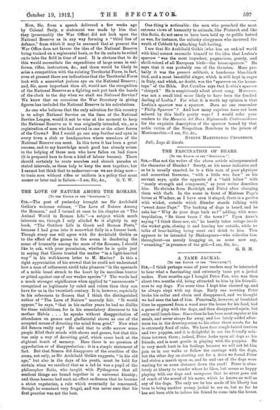THE LOVE OF NATURE AMONG THE ROMANS. [To THE EDITOR
OF THE "SPECTATOR."] SIR,—The post of yesterday brought me Sir Archibald Geikie's welcome volume, The Love of Nature Among the Romans," and I turned at once to his chapter on "The Animal World in Roman Life "—a subject which much interests me, though I only alluded to it slightly in my book, "The Outdoor Life in Greek and Roman Poets," because I had gone into it somewhat fully in a former book. Though every one will agree with Sir Archibald Geikie as to the effect of the games in the arena in deadening the sense of humanity among the mass of the Romans, I should like to ask, with your permission, whether he is quite just in saying that Cicero treated the matter " in a light-hearted way " in his well-known letter to N. Marius ? Is this a right appreciation of his avowal that he could not understand bow a man of refinement could take pleasure " in the spectacle of a noble beast struck to the heart by its merciless hunter or pitted against one of our weaker species" ? The words had a much stronger significance when applied to " amusements " recognized as legitimate by ruled and rulers than they can have for us in the twentieth century. It is, however, especially in his references to Seneca that I think the distinguished author of "The Love of Nature" scarcely fair. "It would appear," he says, " that in his earlier years he had no dislike for these exhibitions, for in his consolatory discourse to his mother Helvia . . . be speaks without disapprobation of attendance on games and gladiatorial shows as one of the accepted means of diverting the mind from grief." Now what did Seneca really say P He said that to stifle sorrow some people filled their minds with shows and games, but that this was only a way of deceiving grief, which came back at the slightest touch of memory. Here there is no question of approbation or of disapprobation : it is a simple statement of fact. But that Seneca did disapprove of the cruelties of the arena, not only, as Sir Archibald Geikie suggests, " in his old age," but also in the days of his youth, must be held for Certain when we recollect that as a lad he was a pupil of the philosopher Sotio, who taught with -Pythagoras that all sentient things are bound together in a universal kinship ; and those lessons had such an effect on Seneca that he became a strict vegetarian, a rule which eventually he renounced, though he remained very frugal, and was never sure that his first practice was not the best,
One thing is noticeable : the men who preached the most extreme views of humanity to animals, like Plutarch and like this Sotio, do not seem to have been held up to public hatred as was, for instance, the unlucky clergyman who incurred the wrath of Cobbett by attacking bull-baiting.
I see that Sir Archibald Geikie (who has an unkind world with him) cannot reconcile himself to the idea that Lesbia's sparrow "was the most impudent, pugnacious, greedy, and shrill-voiced of all European birds—the house-sparrow." Ha says that it was probably one of the thrushes. More pro- bably it was the passero solitario, a handsome blue-black bird, and a most beautiful singer, which is still kept in cages- in Italy, and which, no doubt, was the "sparrow on the house- tops" of the Bible. But Catullus says that Lesbia's sparrow "chirped." He is suspiciously silent about song. Moreover, was not a small bird more likely to have been the fondled darling of Lesbia P For what it is worth my opinion is that Lesbia's sparrow was a sparrow. Does no one remember " Philip Sparrow "? And how many captives have not been solaced by this bird's pretty ways P I would refer your readers to the Armoric del Duca Sigismondo Castromediano for the exquisite description of the sparrow tamed by that noble victim of the Neapolitan Bourbons in the prison of Montesarchio.—I am, Sir,














































 Previous page
Previous page